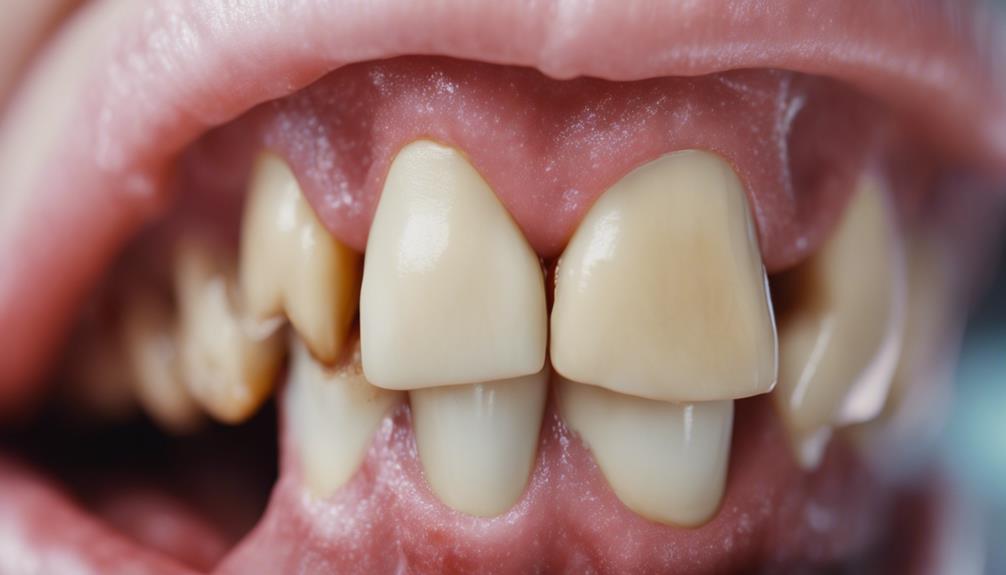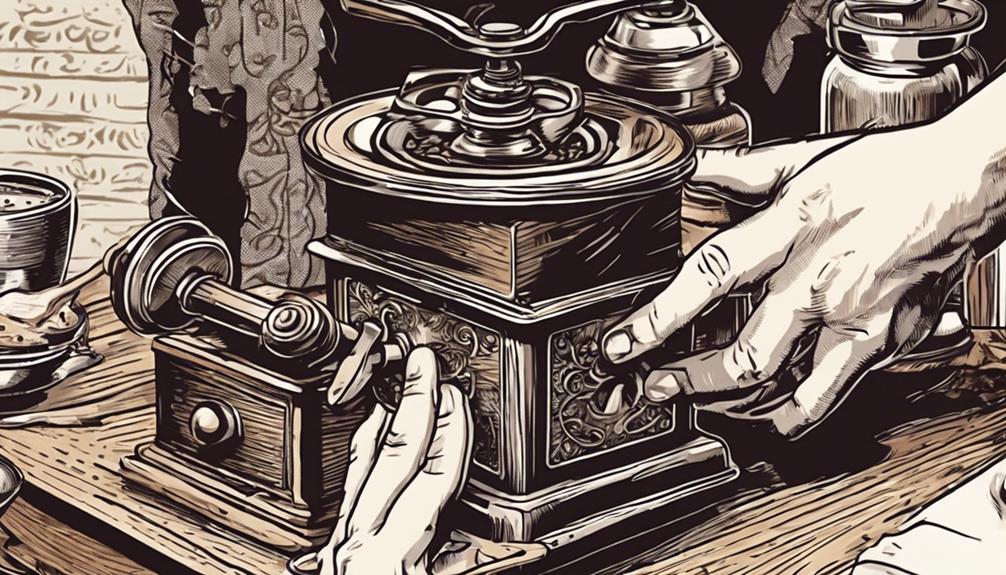The acidity of coffee, with a pH around 5, can lead to enamel erosion. Enamel is essential for protecting teeth, but acidic beverages can make it thin, brittle, and discolored. The tannins in coffee can stain teeth yellow by sticking to the enamel. Erosion can make teeth sensitive, more prone to decay, and further staining. When tannins wear down enamel, it exposes the inner layers of the teeth, making them more sensitive.
To prevent enamel damage caused by coffee, it is important to limit intake, use fluoride toothpaste, and avoid brushing immediately after drinking coffee. Regular dental check-ups can help detect erosion early on, and fluoride treatments and sealants can help protect enamel. Using straws when drinking can reduce direct contact with teeth, preserving enamel health. Proper oral hygiene habits and professional care are crucial for maintaining healthy enamel. For more information on enamel health, additional details can provide valuable insights.
Key Takeaways
- Coffee's acidity erodes enamel, leading to thinning and vulnerability to decay.
- Tannins in coffee adhere to enamel, causing yellow stains and increased erosion.
- Enamel erosion from coffee can result in sensitivity, brittleness, and discoloration.
- Regular coffee consumption can contribute to enamel thinning, cavities, and sensitivity.
- Drinking water after coffee and using fluoride toothpaste can help protect enamel from erosion.
Acidity and Enamel Erosion
Coffee's acidity poses a significant threat to tooth enamel, leading to erosion and potential dental issues. With a pH level around 5, coffee is considered an acidic drink that can harm the important layer covering your teeth.
This important layer, known as enamel, plays a vital role in safeguarding your teeth from decay and damage. However, the acidic nature of coffee can break down this enamel, making your teeth more vulnerable to enamel erosion.
As enamel erosion progresses due to regular consumption of acidic beverages like coffee, your teeth may become thinner, brittle, and prone to sensitivity, cavities, and discoloration. It's essential to be mindful of the impact of acidic drinks on your dental health to prevent long-term issues.
Tannins and Tooth Staining

Moreover, the presence of tannins in coffee contributes to tooth staining by adhering to enamel and causing discoloration.
Tannins are natural compounds found in coffee that bind to proteins in the enamel, leading to the formation of yellow stains over time. When tannins attach to the enamel, they create an environment conducive to discoloration, particularly when combined with the acidity of coffee.
This staining effect can be visually unappealing and challenging to remove through regular brushing alone.
Additionally, the erosion of enamel from tannins in coffee not only causes staining but also makes teeth more vulnerable to decay and sensitivity.
To prevent these issues, limiting exposure to tannin-rich beverages like coffee is recommended. By reducing the contact between tannins and tooth enamel, you can help maintain the natural whiteness of your teeth and protect them from the detrimental effects of staining and erosion.
Impact on Tooth Sensitivity
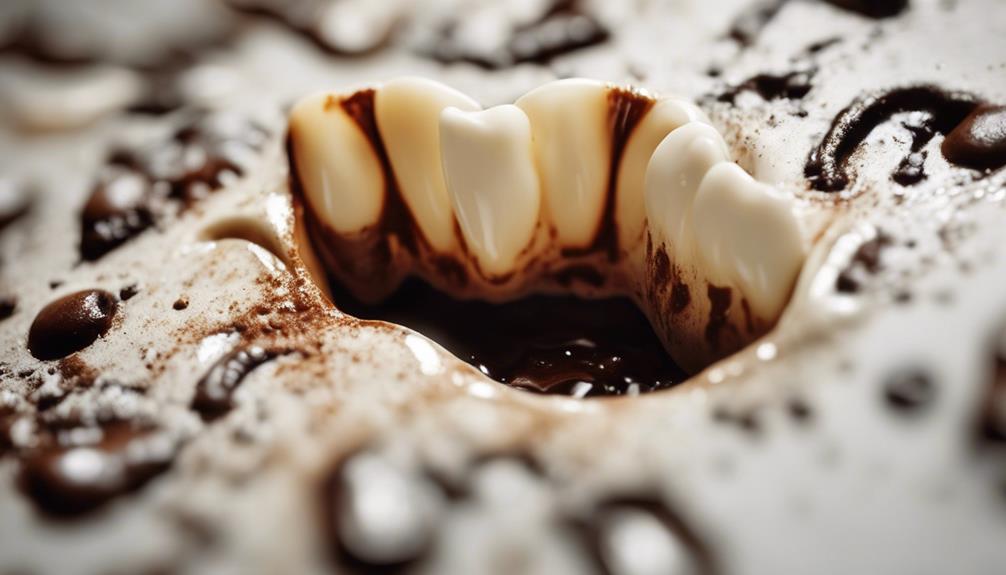
Regular consumption of coffee can lead to increased tooth sensitivity due to its acidic nature and erosion of enamel. The acidity of coffee can wear down the protective enamel covering your teeth, exposing the more sensitive inner layers.
As enamel erodes from frequent coffee consumption, you may experience discomfort when consuming hot or cold foods due to increased tooth sensitivity. This thinning and weakening of enamel can also make your teeth more prone to sensitivity from pressure and touch.
With a pH level around 5, coffee gradually wears down enamel, leaving the nerves in your teeth more exposed and susceptible to sensitivity.
To help combat tooth sensitivity caused by coffee consumption, it's essential to prioritize enamel health through proper dental care practices. By maintaining good oral hygiene and seeking professional dental advice, you can reduce the impact of enamel erosion and alleviate tooth sensitivity associated with your coffee habit.
Yellowing Effects on Enamel
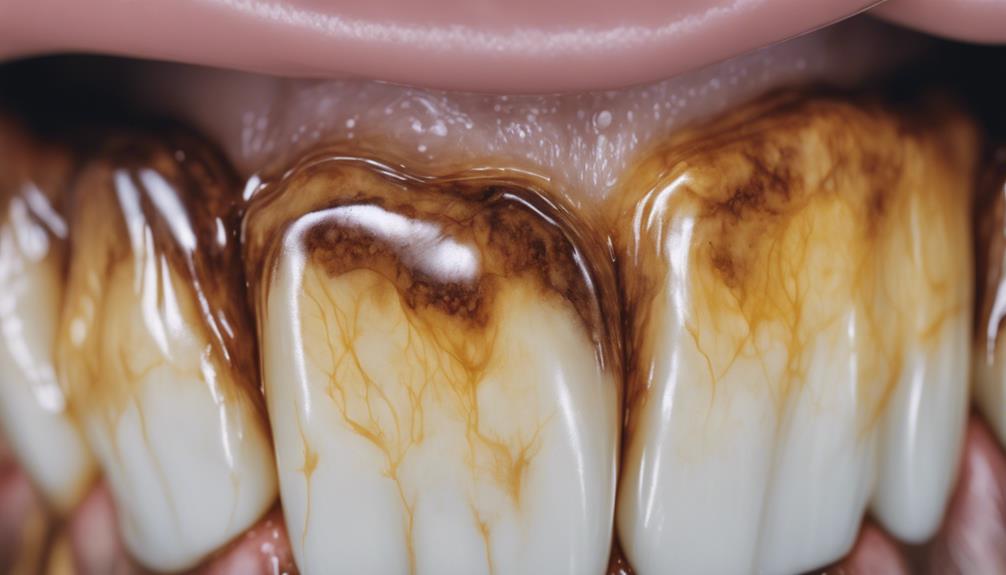
Coffee's tannins can stick to your tooth enamel, leading to yellow stains.
The acidity in coffee weakens enamel, making it more prone to discoloration.
Over time, this erosion can result in a yellowed appearance on your teeth.
Enamel Discoloration Causes
Continuous exposure to coffee weakens tooth enamel, causing yellow stains due to tannin buildup and erosion from its acidic pH. The tannins present in coffee have a tendency to adhere to the enamel surface, leading to the formation of unsightly yellow discoloration over time.
Moreover, the acidic nature of coffee can gradually erode the enamel, making the teeth more susceptible to staining and discoloration. This erosion can result in the enamel losing its natural protective layer, exposing the underlying dentin, which is naturally yellowish in color.
The porous structure of enamel also plays a role in allowing coffee compounds to penetrate and cause staining from within. As a result, the combination of tannin buildup and enamel erosion from the acidic pH of coffee contributes significantly to the yellowing effects observed on tooth enamel.
It's essential to be aware of these factors to understand how coffee consumption can impact the color and health of your teeth.
Preventing Yellowing Effects
To prevent yellowing effects on your enamel from coffee, it's important to maintain good oral hygiene and visit your dentist regularly for check-ups.
Coffee's acidity can lead to enamel erosion, exposing the yellow dentin layer underneath and causing discoloration. Tannins in coffee can also adhere to enamel, resulting in yellow stains over time.
To prevent staining and enamel erosion, consider using enamel-strengthening toothpaste and limiting acidic beverages like coffee. Brushing your teeth at least twice a day and flossing daily can help remove coffee residues and maintain enamel health.
Visiting your dentist for professional cleanings and check-ups is vital in identifying early signs of enamel damage and addressing them promptly.
Prevention Through Straw Usage

How can you effectively protect your tooth enamel from coffee's erosive effects while enjoying your favorite beverage?
Using a straw is a simple yet effective method to safeguard your enamel from the acidic nature of coffee. Straws create a barrier between the coffee and your teeth, reducing direct contact and minimizing the exposure of enamel to erosion-causing acids.
By sipping your coffee through a straw, you can greatly decrease the risk of enamel damage that occurs when the acidic beverage comes into contact with your teeth. Moreover, straws prevent coffee from swishing around in your mouth, limiting the time the acidic liquid spends in contact with your enamel, further decreasing the risk of erosion.
Incorporating the use of a straw into your daily coffee-drinking routine is a practical way to help maintain the health of your tooth enamel and minimize the potential damage caused by acidic beverages like coffee.
Optimal Toothbrushing Timing
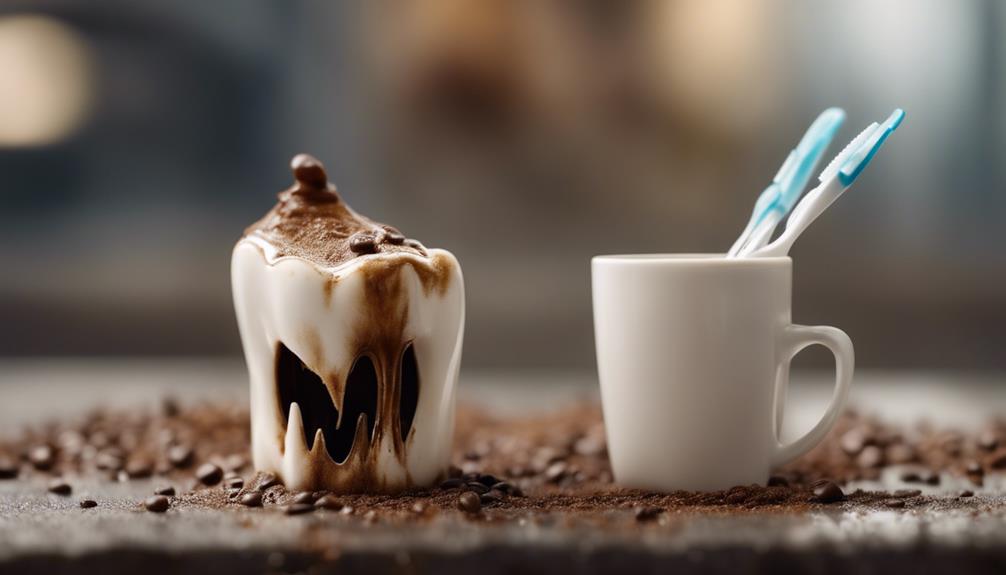
Protecting your tooth enamel from coffee's erosive effects extends beyond using a straw; timing your toothbrushing appropriately post-coffee is essential to prevent further enamel weakening. Enamel wear is a real concern when it comes to brushing your teeth after consuming acidic drinks like coffee.
The acid erosion caused by coffee softens the enamel, making it more vulnerable to damage. Brushing too soon after drinking coffee can exacerbate this issue, leading to sensitivity and potential erosion over time. It's recommended to wait at least 30 minutes after having coffee before brushing your teeth.
During this time, saliva works to neutralize the acids in your mouth, allowing the enamel to re-mineralize and strengthen. By waiting before brushing, you give your enamel the chance to recover from the acidic assault, reducing the risk of enamel wear and protecting your teeth from the harmful effects of acid erosion caused by coffee.
Strengthening Enamel With Fluoride
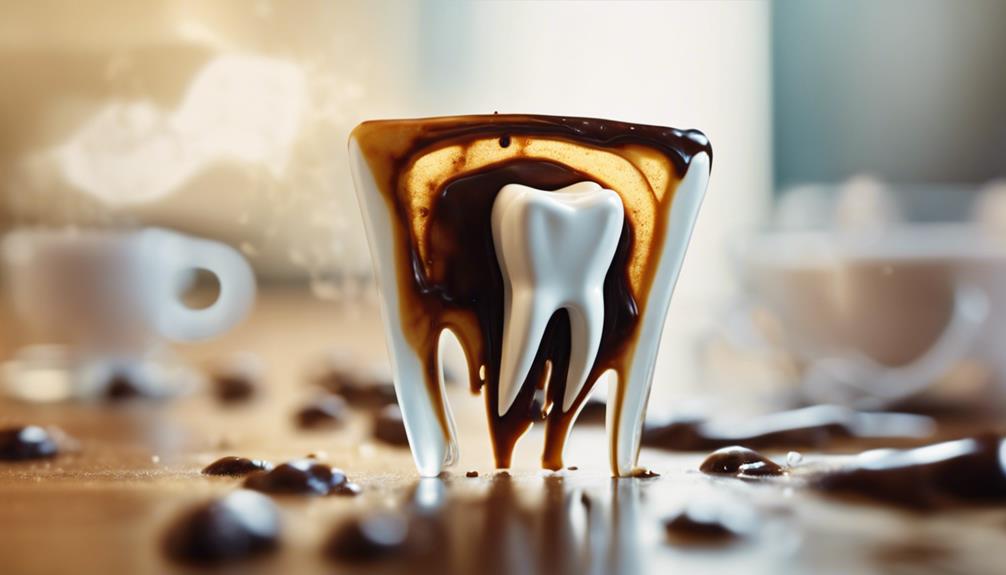
Strengthen your tooth enamel by utilizing fluoride to remineralize and repair damage caused by acidic substances like coffee. Fluoride plays a vital role in protecting your teeth from enamel erosion due to acidic drinks.
Here are three essential ways fluoride helps in strengthening enamel:
- Remineralization: Fluoride aids in remineralizing the enamel, repairing microscopic damage caused by acidic beverages like coffee. This process helps to restore the minerals that make up the enamel, enhancing its strength and resilience.
- Prevention of Erosion: Regular exposure to fluoride, whether through toothpaste or professional treatments, can prevent enamel erosion resulting from the consumption of acidic drinks like coffee. It forms a protective layer on the teeth, making them more resistant to acid attacks.
- Maintenance and Protection: Incorporating fluoride into your dental care routine, such as using fluoride toothpaste and treatments, can help maintain enamel health and counteract the detrimental effects of coffee consumption on your teeth.
Frequently Asked Questions
Does Coffee Damage Tooth Enamel?
Coffee does indeed damage tooth enamel due to its acidic nature, with a pH level around 5. This acidity gradually erodes enamel, leading to increased sensitivity and brittleness. Additionally, the dark pigments in coffee can also stain the teeth, leading to discoloration over time. It’s important to note that while coffee is a major source of caffeine, it is not the only one. Caffeine is also found in tea, soda, and even chocolate. As for the question, “do coffee leaves contain caffeine?” the answer is yes. Coffee leaves do contain caffeine, although in lower quantities compared to the coffee beans themselves.
The weakened enamel becomes more vulnerable to damage and decay. Regular coffee consumption without proper oral care can contribute to enamel erosion over time.
Protecting your enamel from coffee erosion requires maintaining good oral hygiene practices and seeking advice from dental professionals.
How Do You Drink Coffee Without Damaging Enamel?
To drink coffee without damaging enamel, consider using a straw to minimize direct contact. Avoid swishing coffee in your mouth and wait 30 minutes before brushing teeth.
Fluoride toothpaste can strengthen enamel against acid erosion. Limit acidic drink intake and brush twice daily for best enamel protection.
These simple habits can help preserve your tooth enamel while enjoying your favorite coffee.
How Do Coffee Drinkers Keep Teeth White?
To keep your teeth white as a coffee drinker, prioritize regular dental check-ups and treatments like Zoom Whitening.
Counteract staining from coffee's tannins by using fluoride toothpaste.
Prevent enamel erosion by practicing good dental care habits.
Seeking professional teeth whitening services can help maintain the whiteness of your teeth despite coffee consumption.
Can the Enamel on Your Teeth Be Restored?
Yes, enamel on your teeth can be restored to some extent. While enamel doesn't regenerate like other body tissues, treatments like fluoride applications can help remineralize and strengthen weakened enamel.
In cases of severe enamel loss, dental bonding or veneers may be necessary. However, prevention through measures like limiting acidic drinks is key to maintaining peak enamel health and avoiding extensive restoration procedures.
Regular dental check-ups can help monitor and address enamel issues effectively.
Conclusion
To sum up, while coffee may be a beloved morning ritual for many, it can have negative effects on tooth enamel due to its acidity and staining properties.
By using a straw, brushing at the best time, and incorporating fluoride into your oral care routine, you can help protect your enamel from the damaging effects of coffee consumption.
Remember, a little prevention can go a long way in preserving your pearly whites.
Stay informed and keep smiling bright!
